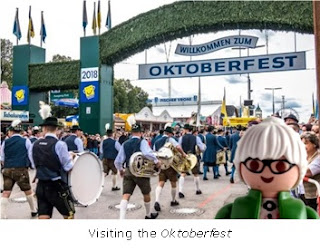The Grandma likes beer, and she loves participating in this wonderful festival.
The Oktoberfest is the world's largest Volksfest, beer festival and travelling funfair.
It is held annually in Munich, Bavaria, Germany. It is a 16- to 18-day folk festival running from mid- or late September to the first Sunday in October, with more than six million people from around the world attending the event every year. Locally, it is called d'Wiesn, after the colloquial name for the fairgrounds, Theresienwiese.
The Oktoberfest is an important part of Bavarian culture, having been held since the year 1810. Other cities across the world also hold Oktoberfest celebrations that are modelled after the original Munich event.
During the event, large quantities of Oktoberfest Beer are consumed. During the 16-day festival in 2013, for example, 7.7 million litres were served. Visitors also enjoy numerous attractions, such as amusement rides, side stalls, and games. There is also a wide variety of traditional foods available.
The Munich Oktoberfest originally took place in the 16-day period leading up to the first Sunday in October.
In 1994, this long-standing schedule was modified in response to German reunification. As such, if the first Sunday in October falls on the 1st or the 2nd, then the festival would run until 3 October (German Unity Day). Thus, the festival now runs for 17 days when the first Sunday is 2 October and 18 days when it is 1 October. In 2010, the festival lasted until the first Monday in October (4 October), to mark the event's bicentennial.
More information: Oktoberfest
Kronprinz Ludwig (1786–1868), later King Ludwig I, married Princess Therese of Saxe-Hildburghausen on 12 October 1810. The citizens of Munich were invited to attend the festivities held on the fields in front of the city gates to celebrate the royal event. The fields were named Theresienwiese, Theresa's Meadow, in honour of the Crown Princess, and have kept that name ever since, although the locals have abbreviated the name simply to Wiesn. Horse races, in the tradition of the 15th-century Scharlachrennen, Scarlet Race at Karlstor, were held on 18 October to honour the newly-weds.
It is widely believed that Andreas Michael Dall'Armi, a Major in the National Guard, proposed the idea. However, the origins of the horse races, and Oktoberfest itself, may have stemmed from proposals offered by Franz Baumgartner, a coachman and Sergeant in the National Guard. The precise origins of the festival and horse races remain a matter of controversy. However, the decision to repeat the horse races, spectacle, and celebrations in 1811 launched what is now the annual Oktoberfest tradition.
The fairground, once outside the city, was chosen due to its natural suitability. The Sendlinger Hill, today Theresienhohe, was used as a grandstand for 40,000 race spectators. The festival grounds remained undeveloped, except for the king's tent. The tastings of Traiteurs and other wine and beer took place above the visitors in the stands on the hill.
At the 100th anniversary of Oktoberfest in 1910, an estimated 120,000 litres of beer were consumed. Three years later, the Bräurosl was founded, which at that time was the largest pavilion to have ever been built, accommodating approximately 12,000 people.
Due to World War I, Oktoberfest was temporarily suspended from 1914 to 1918. The two years after the war, in 1919 and 1920, Oktoberfest was replaced by the so-called kleineres Herbstfest, which can be translated as smaller autumn celebration, and in 1923 and 1924 the Oktoberfest was cancelled due to hyperinflation.
During National Socialism, Oktoberfest was used as part of Nazi propaganda. In 1933, Jews were forbidden to work on the Wiesn. Two years later, Oktoberfest's 125th anniversary was celebrated with all the frills. The main event was a big parade.
The slogan proud city -cheerful country was meant to show the alleged overcoming of differences between social classes, and can be seen as an example of the regime's consolidation of power.
More information: Muenchen
In 1938, after Hitler had annexed Austria and won the Sudetenland via the Munich Agreement, Oktoberfest was renamed to Großdeutsches Volksfest, Greater German folk festival, and as a showing of strength, the Nazi regime transported people from Sudetenland to the Wiesn by the score.
During World War II, from 1939 to 1945, no Oktoberfest was celebrated. Following the war, from 1946 to 1948, Munich celebrated only the Autumn Fest. The sale of proper Oktoberfest beer -2% stronger in gravity than normal beer- was not permitted; guests could only drink normal beer.
Since its foundation, there have been 26 years in which it was declined.
Beginning in 1950, the festival has always been opened with the same traditional procedure: At noon, a 12-gun salute is followed by the tapping of the first keg of Oktoberfest beer by the Mayor of Munich with the proclamation O'zapft is!, It's tapped! in the Austro-Bavarian dialect.
To keep the Oktoberfest, and especially the beer tents, amicable for the elderly and families, the concept of the quiet Oktoberfest was developed in 2005. Until 6:00 pm, the orchestras in the tents only play brass music, for example traditional folk music. Only after that may Schlager pop or electric music be played, which had led to excessively raucous behaviour in earlier years. The music played in the afternoon is limited to 85 decibels. With these rules, the organizers of the Oktoberfest were able to curb the tumultuous party mentality and preserve the traditional beer-tent atmosphere.
The six main Munich breweries Augustiner, Hacker-Pschorr, Hofbräu, Löwenbräu, Paulaner and Spaten presented a special exclusively brewed dark beer, which was made after a historic recipe from the early 19th century.
More information: The Local
Durst wird durch Bier erst schön.
Thirst is only beautiful when accompanied by beer.
German Quote


No comments:
Post a Comment